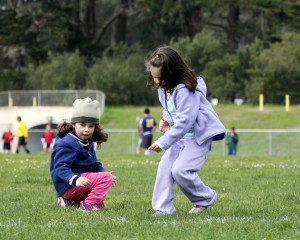Theorists characterize play as:
- a subjective experience of freedom
- an absence of social obligation and physical necessity
- a subjective experience that is absorbing, compelling, or pleasurable
- occurence in a separate realm sometimes referred to as the magic circle

Participation in virtual worlds is not simulation but performance. There is no faking performance; it is brutally honest. The software enforcing the rules and the players watching to see whether you click the cube at the right moment compel honesty (Nardi 2010:90)
In World of Warcraft, the narrative and goals of the game world bound people in a shared fantasy in which repetitive actions could be generative of positive meanings and emotions. (Nardi 2010:115)
WoW was engineered to require sociability for the most challenging content, but it only weakly developed community as shared commitments and durable social bonds (Nardi 2010:64-65).
Methods of participatory design are intended to balance power among stakeholders. Participatory design is deliberately democratic. I cannot speak too highly of democracy as a political system, but artistic production is, to me, another matter; it is inherently singular, anomalous, moving on the edges of culture. It has no interest in balancing competing claims through fairness or compromise, although it is, of course, not immune to influences outside itself (Nardi 2010:80)
(Excerpt from my work below)
Although there are earlier ethnographic studies that approached sports as part of the traditional and ritual practices of indigenous groups (e.g. Mooney 1890, Gmelch 1972, Leach and Kildea 1975), the anthropological study of sports has been peripheral as a field for two reasons: the dismissal by academics of the value in examining popular culture (Mukerji and Schudson 1991) and the historical focus of anthropology on the “primitive” or non-modern. Modern sports are distinguished from a more general category of “play” in that it is organized, bureaucratized, and not purely spontaneous (Guttman 1978). Much of the contemporary study of sports (especially in European sociology) is based upon the seminal work of Norbert Elias, who approached sports as a necessary product of modernity by what he refers to as “the civilizing process” (Elias and Dunning 1986; see also Carter 2002; Archetti 1998; Brownell 1995:25-27, Hardy 1997). Sports, as defined by Elias, are “contests involving bodily strength or skills of a non-military type [with] rules constraining the contestants … aimed at reducing the risk of physical injury to a minimum” (Elias and Dunning 1986). For Elias, a key component of sports is the bureaucratic control of violence through the establishment of rules and organizations that enforce them. Elias further adds that sports, as an element of leisure, are an outcome of industrialization, in that work becomes increasingly differentiated from leisure in a dialectical manner (c.f. Lithman 2000). Work in modern societies imposes a rigorous restraint on individuals, increasing a sense of alienation that, according to Elias, is relieved by the “quest for excitement” in leisure (Elias and Dunning 1986; c.f. communitas in Turner 1969). Sports are therefore a necessary part of modernity that provides society with a mimetic excitement that gives individuals a liberating, cathartic experience within the iron cage of modern life. Sports, however, must have the same kind of restraints as wider society for society to maintain its cohesion – as part of the Weberian process of rationalization, sports organizations developed structures and cultural norms that limit violence.